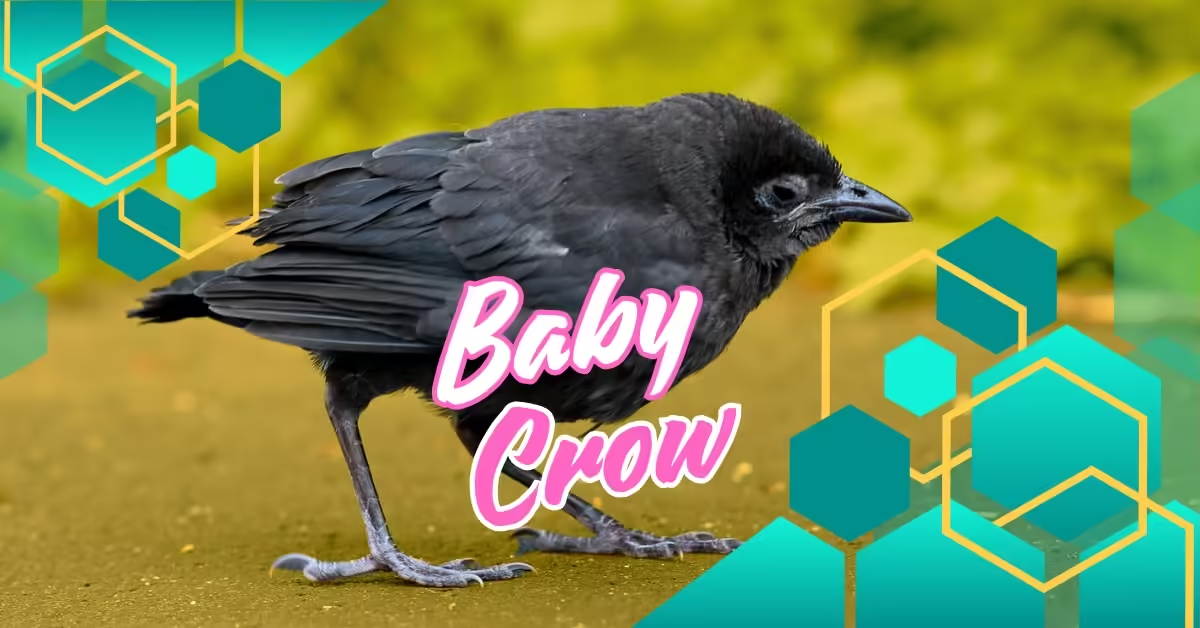Crows are known for their intelligence, social behavior, and adaptability, but what about their young? Baby crows, also called nestlings or fledglings, are fascinating creatures that go through an incredible journey from birth to adulthood. These baby birds are often misunderstood, but learning about them can reveal just how complex and interesting they are.
In this post, we’ll dive into five amazing facts about baby crows that you probably didn’t know. From their early development to how adult crows care for them, there’s much to discover about these young, intelligent birds.
Understanding Baby Crow Development Stages
Like many birds, baby crows go through several development stages before becoming fully independent. Understanding these stages can help bird lovers and wildlife enthusiasts identify where a baby crow is in its growth process.
1. Nestling Stage:
A baby crow is born blind, featherless, and entirely dependent on its parents. During the first few weeks, baby crows are called “nestlings” because they spend most of their time in the nest. Their parents bring food to them and keep them warm.
2. Fledgling Stage:
At about 4-6 weeks old, the baby crow begins to grow feathers and becomes more mobile. At this stage, it’s known as a “fledgling.” Fledglings often hop around the ground as they learn to fly, which can make them seem vulnerable. However, their parents usually remain nearby, watching over them as they practice flying.
3. Juvenile Stage:
Once a baby crow has learned to fly and forage for food, it enters the juvenile stage. At this point, the young crow is more independent, though it may still rely on its parents for guidance and protection for several months.
Understanding these stages can help you determine if a baby crow you find needs assistance or if it’s simply learning to fly.
What Do Baby Crows Eat? Essential Feeding Tips
Baby crows have a varied diet, but their parents play a critical role in ensuring they get the right nutrients. When they are first born, baby crows rely entirely on their parents to bring them food. The diet of a baby crow is high in protein to support their rapid growth.
Foods Baby Crows Eat:
- Insects and Worms: In the early weeks, baby crows are fed soft insects like caterpillars, earthworms, and beetles, which are easy to digest.
- Small Rodents: As they grow older, the parents will bring small rodents or other birds to provide more substantial meals.
- Fruits and Vegetables: Crows are omnivores, and baby crows also eat berries, seeds, and small pieces of fruits and vegetables.
- Human Food Scraps: While it’s not recommended to feed them processed human foods, crows have been known to eat scraps from urban environments.
If you come across a baby crow in need of help, it’s important to avoid feeding them bread or milk, as these can harm them. Instead, offer softened dog or cat food or scrambled eggs until you can contact a wildlife expert.
How to Help a Baby Crow if You Find One
It’s common to come across a baby crow on the ground, especially in spring or early summer when fledglings are learning to fly. However, not every baby crow you find needs assistance. Before intervening, it’s essential to assess the situation.
When to Help:
- Injured Baby Crows: If the baby crow is visibly injured, unable to move, or bleeding, it likely needs help. In this case, contact a wildlife rehabilitator for guidance.
- Orphaned Baby Crows: If the parents are not nearby, and the baby crow has been left alone for several hours, it may be orphaned and need help.
How to Help:
- Keep a Safe Distance: If the baby crow is uninjured and hopping on the ground, it’s likely a fledgling learning to fly. Its parents are probably watching from a distance. It’s best to leave it alone unless it’s in immediate danger (e.g., near a busy road).
- Contact a Professional: If you’re unsure whether the baby crow needs help, reach out to a local wildlife center for advice.
Handling wildlife should always be done with care and only when absolutely necessary to avoid causing harm.
Crow Parenting: How Adult Crows Care for Their Babies
Crows are known for their exceptional parenting behavior. Adult crows are highly attentive and protective of their young, often going to great lengths to ensure their survival. This makes them one of the most dedicated bird species when it comes to parenting.
1. Feeding:
Adult crows continuously feed their young, especially during the nestling and fledgling stages. They hunt for food such as insects, small animals, and fruits to ensure their babies get the necessary nutrients for growth.
2. Teaching Survival Skills:
As baby crows grow, adult crows teach them essential skills such as flying and foraging for food. These lessons are critical for the crow’s independence and survival in the wild.
3. Protection:
Crows are highly protective of their nests and young. Adult crows will often aggressively defend their babies from predators or even humans who get too close. In urban areas, it’s not uncommon to see crows dive-bombing to protect their fledglings on the ground.
Crow families often remain together long after the young have learned to fly, showcasing the strong familial bonds in this intelligent species.
When Do Baby Crows Leave the Nest?
Baby crows typically leave the nest, or “fledge,” at around 4-6 weeks old. During the fledgling stage, they will spend some time hopping around the ground as they build up strength in their wings. This can sometimes be mistaken for a crow in distress, but it’s part of their natural learning process.
Timeline of Leaving the Nest:
- First Few Weeks: Baby crows remain in the nest, relying on their parents for food and warmth.
- Fledgling Stage: At around 4-6 weeks, they leave the nest but still depend on their parents for protection and food. This stage can last several weeks.
- Full Independence: By the time they are 8-10 weeks old, most baby crows can fly and forage independently, though they may stay close to their family group for several months.
Crows are highly social, so even after they leave the nest, they often remain part of their family unit for an extended period, learning from their parents and older siblings.
Baby Crow Sounds: What Do They Mean?
One way to identify a baby crow is through the sounds they make. Baby crows communicate with their parents and siblings through a variety of calls, each serving a different purpose.
Common Baby Crow Sounds:
- Begging Call: A high-pitched call used by baby crows to request food from their parents.
- Distress Call: If a baby crow feels threatened or is in danger, it may use a sharp, continuous sound to alert its parents.
- Chatter: As baby crows grow, they begin to imitate adult crow sounds, practicing their “caw” and other vocalizations.
Understanding these sounds can help you determine whether a baby crow is in need of assistance or simply calling out to its parents.
How to Identify a Baby Crow vs Other Baby Birds
Identifying a baby crow can sometimes be challenging, especially since fledgling crows can resemble other bird species. However, there are a few distinct features to look for.
Key Characteristics of a Baby Crow:
- Feather Color: Baby crows have grayish-black feathers when they first fledge, which will darken as they mature.
- Beak Shape: A baby crow has a larger, more prominent beak compared to other baby birds.
- Size: Even as fledglings, baby crows are relatively large, with a robust body compared to smaller birds like sparrows or robins.
By looking for these features, you can easily differentiate a baby crow from other young birds in your area.
For more tips and guides, visit our homepage at My Read Magazine and explore a world of helpful content!
Conclusion
Baby crows are remarkable creatures that go through distinct development stages, from helpless nestlings to independent juveniles. Learning about their growth, diet, and behavior provides valuable insight into how to care for or help a baby crow if you come across one. Remember, not every baby crow needs assistance, but understanding their needs and habits ensures they receive the proper care when necessary.
Frequently Asked Questions About Baby Crows
- What do baby crows eat?
- Baby crows eat a diet of insects, small animals, and fruits, brought to them by their parents.
- When do baby crows leave the nest?
- Baby crows typically leave the nest at around 4-6 weeks old, during the fledgling stage.
- How can I help a baby crow?
- If you find an injured or orphaned baby crow, contact a wildlife rehabilitator. If the crow is a fledgling learning to fly, it’s best to leave it alone unless it’s in immediate danger.
- Are baby crows cared for by both parents?
- Yes, both parents actively participate in feeding, protecting, and teaching their young.
- How long do baby crows stay with their parents?
- Baby crows often remain with their parents for several months, even after they can fly and forage independently.
- What should I do if I hear baby crow sounds in my yard?
- Baby crow sounds are often begging calls or practice calls as they develop. Keep a safe distance and observe, as their parents are likely nearby.
- Do baby crows look different from adults?
- Yes, baby crows have lighter gray feathers and a larger beak compared to adults.
- How can I tell if a baby crow is injured?
- An injured baby crow may be immobile, visibly wounded, or unable to hop or fly. Contact a wildlife expert if you notice these signs.
- Why are baby crows on the ground?
- Fledgling crows often hop around on the ground as they learn to fly. This is a natural part of their development.
- Can I feed a baby crow human food?
- It’s best to avoid processed human food. Instead, offer high-protein options like softened dog food or scrambled eggs if immediate help is needed.

Joseph Bush is a seasoned writer and researcher with over 7 years of experience covering a wide range of general topics, from lifestyle and technology to business and current events. He is dedicated to producing fact-checked, reader-friendly content that informs, engages, and empowers readers.
Throughout his career, Joseph has followed strict editorial guidelines, relied on reputable sources, and ensured every article meets the highest standards of accuracy and clarity. His expertise spans multiple fields, allowing him to explain complex topics in a way that’s easy to understand.
Passionate about continuous learning, Joseph stays updated on industry trends and best practices to deliver trustworthy, well-rounded insights. Readers can rely on his work for its credibility, depth, and real-world relevance.




